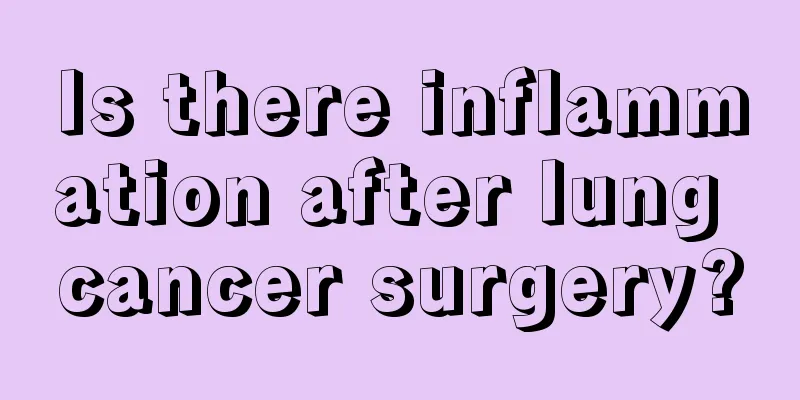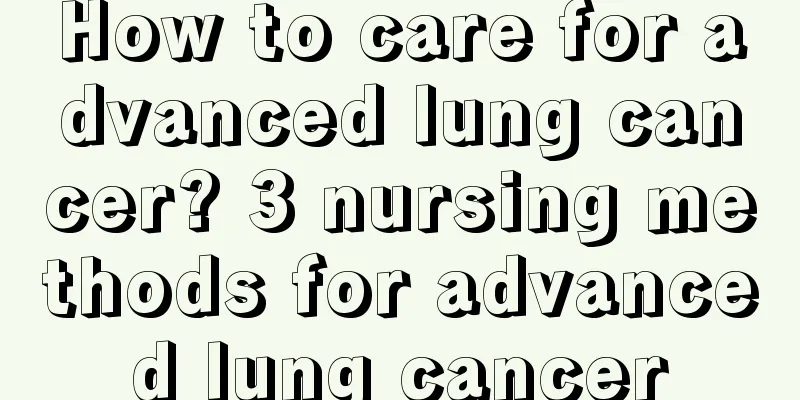Is there inflammation after lung cancer surgery?

|
In life, we are very afraid of various cancers because cancer may be an incurable disease. Even if it is cured, it may spread or recur. In fact, patients will have some inflammation after surgery, and it will take several years to completely kill the disease. 1. Subsequent treatment after lung cancer surgery Patients with stage II or above lung cancer generally receive adjuvant chemotherapy 3-4 weeks after surgery. Chemotherapy is usually given once every three weeks, for 4-6 times. Patients in stage Ia should not receive adjuvant chemotherapy after lung cancer surgery. They must maintain an optimistic and cheerful mood and have long-term regular follow-up. They should have a check-up every three months within two years after surgery, and then every six months. After the fifth year, the check-up can be extended to once a year. Believe firmly that lung cancer can be cured, face cancer correctly, and live a positive life. 2. Diet after lung cancer surgery. The principle of diet after lung cancer surgery should be light, soft, easy to digest and absorb. When choosing food and taking supplements, do not rush for success. You can start with a liquid diet. When there is no obvious discomfort, you can transition to semi-liquid food and normal food. When choosing a diet, you should also pay attention to the balance of various nutrients to facilitate the body's recovery after surgery. During the recovery period, maintain a normal diet, except for spicy and irritating foods, fried foods, tobacco and alcohol. Eat more fresh vegetables and fruits, such as green, yellow and red vegetables, as well as black fungus, almond juice, water chestnuts, asparagus, lemons, red dates, turtle, yellow croaker, sweet almonds, walnuts, jujubes, mushrooms, etc. In addition, depending on the different symptoms, foods that have the effects of relieving cough, reducing fever, stopping bleeding, relieving gas, relieving chest tightness and relieving pain should be selected in a targeted manner to relieve pain. 3. Life care after lung cancer surgery Life care after lung cancer surgery can also be discussed from both psychological and physiological aspects. In terms of mentality, patients with early lung cancer need to understand that there is a possibility of recurrence after surgery or a possibility of complete cure. They must have a correct understanding of their condition and side effects during treatment, and must maintain an optimistic and cheerful mood and firmly believe that they can overcome the disease. Only by adjusting your mindset, building up confidence, and actively cooperating with treatment can you mobilize the body's internal disease resistance mechanism. Being negative and pessimistic, and worrying all day about whether the disease will relapse is very detrimental to recovery. In terms of physiology, in addition to dietary adjustments, patients should pay attention to the maintenance of their respiratory tract, pay attention to changes in climate, and try to avoid colds. If an upper respiratory tract infection occurs, they should seek medical attention and medication in time for thorough treatment to avoid pneumonia. Do not stay in places with polluted air and avoid breathing secondhand smoke. If you have some irritating coughs, don't be nervous. You must cough up phlegm in time. If the phlegm is thick, you can take some expectorants such as Mucosolvan. If the cough is severe and affects your rest, you can choose to take mild cough suppressants such as compound licorice mixture, Claritin, etc. If you feel needle-like pain and numbness in the surgical wound, it is related to the severance of the chest wall nerves during the operation. At this time, the patient's family should comfort the patient and ask him to wait patiently and help him distract his attention. After several months, this discomfort will gradually subside. Things to note after surgery for lung cancer patients: Wounds, sitting and lying positions. After treatment, lung cancer patients should avoid going to public places as much as possible to avoid wound infection; patients should avoid lifting heavy objects to avoid tearing the wound; they should always pay attention to the healing of their wounds, and return to the hospital for examination in time if redness, swelling, heat, pain or fever occurs; pay attention to the sitting and lying positions, and semi-sitting is preferred, because the downward movement of the diaphragm will cause the lungs to expand and affect breathing. |
<<: Why do my nails become thicker after I cut them?
Recommend
Is liver cancer contagious? It's related to the cause of the disease
Whether liver cancer is contagious depends on the...
How to treat vitiligo?
Vitiligo is a common skin disease. Patients with ...
What tests should be done for kidney stone reexamination
Patients with kidney stones must cooperate with t...
How to prevent teratoma in winter
In fact, when the human embryo is developing, the...
What is the difference between fungi and bacteria?
We often hear about bacterial infection, fungal i...
Reaction to the pentavalent vaccine
One of the great achievements of modern medicine ...
What to do with the sequelae of femoral fracture
In daily life, many of our friends are engaged in...
Can I do thread embedding for double eyelids?
Most women are very happy to pursue beauty, espec...
Is renal hamartoma benign? How to treat it?
Renal hamartoma is a benign tumor that is usually...
Experts introduce hormone therapy for cervical cancer
There are many ways to treat cervical cancer, and...
Can bath salts be used to wash your face?
Bath salts can actually be used to wash your face...
Dizziness and fatigue in late pregnancy
Women during pregnancy will experience some pregn...
What are the causes of cervical precancerous lesions? There are 4 main causes of cervical precancerous lesions
Gynecologists point out that cervical cancer is o...
Is white sugar sucrose?
White sugar is a condiment with a very white colo...
How to boil water correctly?
Many people have to drink boiled water, because s...









